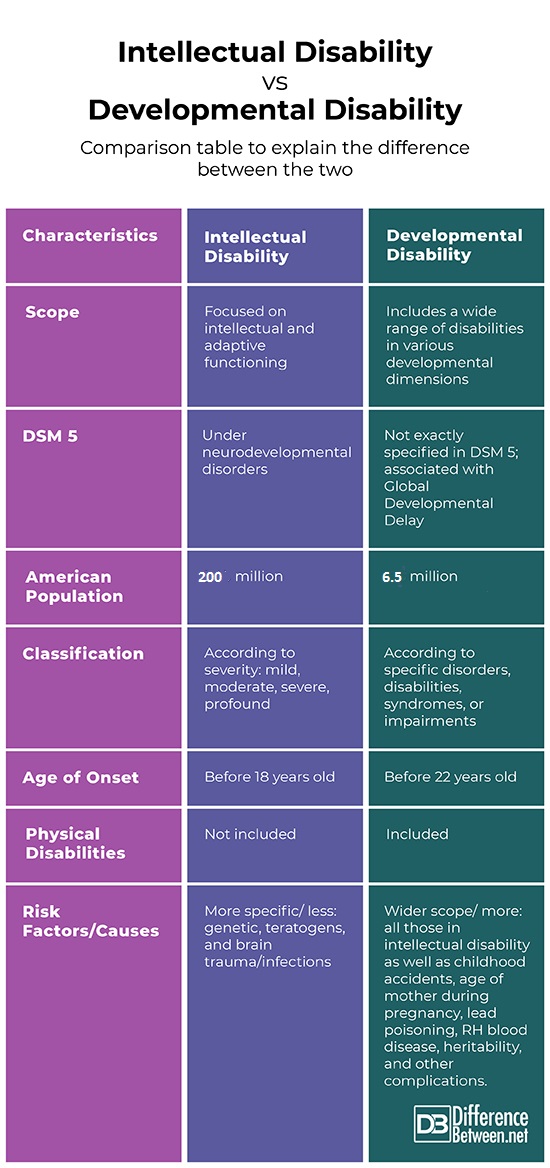Difference Between Intellectual Disability and Developmental Disability
Both intellectual and developmental disabilities are often manifested by early childhood and are likely to be lifelong. These terms may be interchanged as they are characterized by a lack of different skills concerning an individuals’ functioning. They also share certain similar probable causes such as malnutrition, trauma, chromosomal abnormalities, and prenatal infections. However, intellectual disability specifically pertains to intellectual and adaptive deficits whereas developmental disability is an umbrella term for a group of conditions characterized by impairments which includes intellectual disability. The following discussions further delve into these distinctions.

What is Intellectual Disability?
Intellectual disability (ID) according to the Diagnostic and Statistical Manual of Mental Disorders, 5th edition (DSM 5) is a type of neurodevelopmental disorder characterized by deficits in intellectual ad adaptive functioning which are observed during childhood (before age 18). This was previously called “mental retardation” which is perceived as an extremely offensive term. The classifications of ID according to severity are mild, moderate, severe, and profound. Those with mild to moderate ID have mild deficits in the sense that they are slower to process information and have difficulties in learning daily living skills; however, they can still function with minimal support. Individuals with severe ID have major deficits and have limited communication skills. Hence, they need supervision when interacting with others. Those with profound ID are not able to live autonomously and need close supervision in various aspects of their lives.

What is Developmental Disability?
Developmental Disabilities are a diverse group of conditions characterized by impairments in various developmental dimensions. Such impairments appear during childhood and usually last throughout the person’s lifetime. Some of the most common developmental disabilities include Down Syndrome, Fetal Alcohol Syndrome, Cerebral Palsy, and Intellectual Disability. Particularly, the DSM 5 sites the disorder, Global Developmental Delay for children who are younger than 5 years old with deficits in several areas. Though there is often no treatment for these disabilities, there are various treatments to ease the symptoms and modulate the severity.
Difference between Intellectual Disability and Developmental Disability
Scope
Intellectual disability is specifically focused on one disorder which is concerned with intellectual and adaptive functioning. On the other hand, developmental disability has a wider scope as it includes various syndromes, congenital blindness, as well as intellectual disability.
DSM 5
The DSM 5 particularly points out “intellectual disability” as one of the disorders under “neurodevelopmental disorders” while the term “developmental disability” was not even mentioned; in fact, the closest term is “Global Developmental Delay” which is the diagnosis given to children who are younger than five years old who do not meet several developmental milestones. However, basing on the definition of developmental disability, this encompasses all the disorders under neurodevelopmental disorders and other disorders of childhood and adolescence which include Autism Spectrum Disorder, Attention-Deficit/Hyperactivity Disorder, Specific Learning Disorder, Intellectual Disability, and Disruptive Mood Dysregulation Disorder.
Population (United States)
Around 200 million of Americans have developmental disabilities and around 6.5 million of them have intellectual disability.
Classification
Individuals with intellectual disability are often categorized according to their severity: mild, moderate, severe, profound. On the other hand, those with developmental disability are usually categorized according to their specific disorders, syndromes, or impairments such as hearing, vision, cognitive, ambulatory, self-care, and independent living.
Age of Onset
The age of onset of intellectual disability as per diagnostic criteria is during childhood, specifically before 18 years old. As for developmental disability, such manifestations should be observed before 22 years old.
Physical Disabilities
Intellectual disability does not include physical disabilities in its criteria while developmental disability encompasses physical disabilities such as vision, hearing, speech, and motor disabilities.
Risk Factors/ Causes
The common causes for intellectual disability include genetic conditions (fragile X syndrome, Down syndrome, Turner’s syndrome, etc.), teratogens (drug use, malnutrition, radiation, illness, etc.), and brain trauma or infections (meningitis, head injury, etc.). It is also important to note that more than half of intellectual disability cases have unknown causes. As for developmental disability, its scope is wider; hence, its risk factors and causes include those of intellectual disability as well as other factors like childhood accidents, age of mother during pregnancy, lead poisoning, RH blood disease, infectious diseases, heritability, birth and newborn complications. Many developmental disability cases have also unknown specific causes.
Intellectual Disability vs Developmental Disability: Comparison Table to Explain the Difference Between the Two

Summary of Intellectual Disability vs Developmental Disability
- Both intellectual and developmental disabilities are manifested by early childhood.
- Intellectual disability, previously termed as mental retardation, is characterized by deficits in intellectual ad adaptive functioning which can be mild, moderate, severe, or profound.
- Developmental Disabilities are a diverse group of conditions characterized by impairments in various developmental dimensions.
- Intellectual disability is a kind of developmental disability.
- DSM 5 specifically indicated “intellectual disability” as a neurodevelopmental disorder while “developmental disability” was not explicitly mentioned.
- There are 200 million of Americans have developmental disabilities and around 6.5 million of them have intellectual disability.
- Intellectual disability is usually classified according to severity while developmental disability is categorized according to the specific syndrome or disability.
- As per diagnostic criteria, the age of onset for intellectual disability is before 18 years old while that of developmental disability is before 22 years old.
- Physical disabilities are not specified in the diagnostic criteria for intellectual disability while they are included in developmental disability.
- The risk factors for intellectual disability are less as compared to developmental disability.
- Difference Between Hematoma and Melanoma - February 9, 2023
- Difference Between Bruising and Necrosis - February 8, 2023
- Difference Between Brain Hematoma and Brain Hemorrhage - February 8, 2023
Search DifferenceBetween.net :
1 Comment
Leave a Response
References :
[0]Image credit: https://www.flickr.com/photos/mdgovpics/6920838969
[1]Image credit: https://en.wikipedia.org/wiki/Intellectual_disability#/media/File:A.F._Tredgold,_Mental_Deficiency_(Amentia)_Wellcome_L0030471.jpg
[2]American Psychiatric Association. Diagnostic and Statistical Manual of Mental Disorders, 5th Ed. Washington, DC: American Psychiatric Publishing, 2013. Print.
[3]Harris, James. Intellectual Disability. New York, NY: Oxford University Press, 2010. Print.
[4]Shogren, Karrie, Fung, Alan, Percy, Maire, Brown, Ivan, and Wehmeyer, Michael. A Comprehensive Guide to Intellectual and Developmental Disabilities. Baltimore, MD: Paul H. Brookes Publishing Co., 2017. Print.

200 million Americans don’t have ID. I’m thinking there was a typo somewhere?